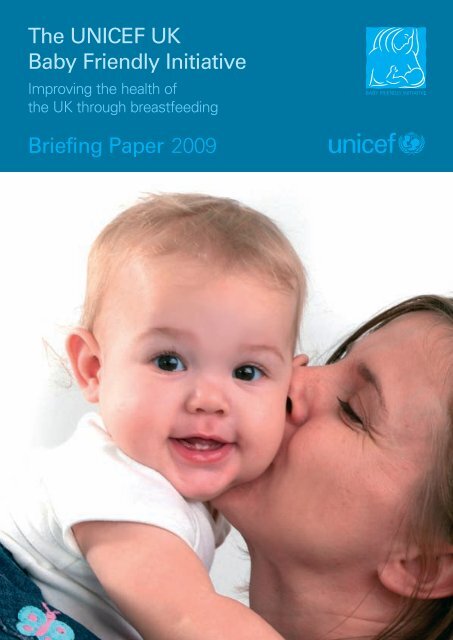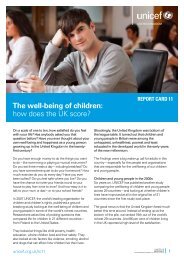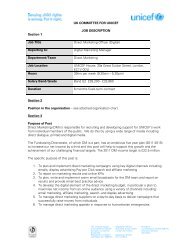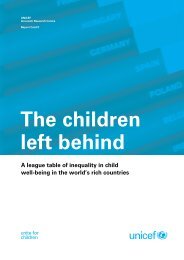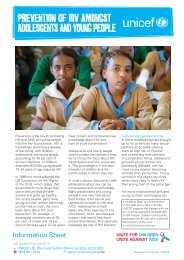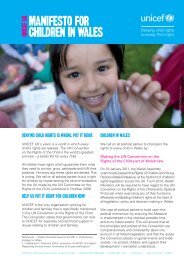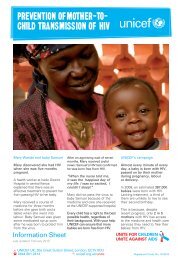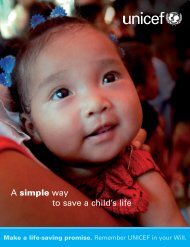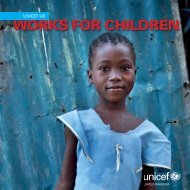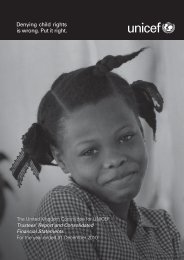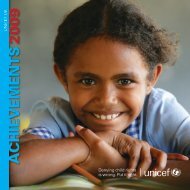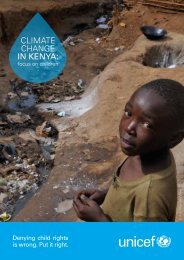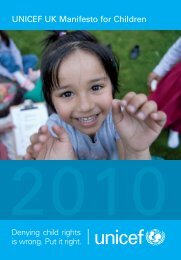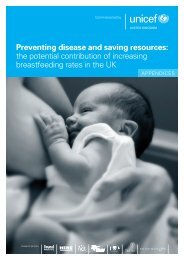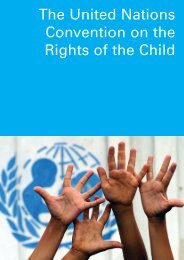The UNICEF UK Baby Friendly Initiative Briefing Paper 2009
The UNICEF UK Baby Friendly Initiative Briefing Paper 2009
The UNICEF UK Baby Friendly Initiative Briefing Paper 2009
Create successful ePaper yourself
Turn your PDF publications into a flip-book with our unique Google optimized e-Paper software.
<strong>The</strong> <strong>UNICEF</strong> <strong>UK</strong><br />
<strong>Baby</strong> <strong>Friendly</strong> <strong>Initiative</strong><br />
Improving the health of<br />
the <strong>UK</strong> through breastfeeding<br />
<strong>Briefing</strong> <strong>Paper</strong> <strong>2009</strong>
<strong>UNICEF</strong><br />
<strong>UNICEF</strong> is the world’s leading organisation<br />
working for children and their rights. We<br />
work with families, local communities,<br />
partners and governments in 191 countries<br />
to help every child realise their full potential.<br />
<strong>UNICEF</strong> <strong>UK</strong> is one of 36 <strong>UNICEF</strong> National<br />
Committees based in industrialised<br />
countries. We work in the <strong>UK</strong> to champion<br />
children’s rights, advocate for lasting change<br />
and raise money for our work with children<br />
everywhere.<br />
Contact <strong>UNICEF</strong> <strong>UK</strong> to arrange a visit to a<br />
<strong>Baby</strong> <strong>Friendly</strong> accredited service in the <strong>UK</strong><br />
Parliamentarians and civil servants<br />
Public Affairs Team<br />
breastfeeding@unicef.org.uk<br />
0207 375 6097<br />
Health professionals<br />
<strong>Baby</strong> <strong>Friendly</strong> Team<br />
bfi@unicef.org.uk<br />
0844 801 2414<br />
For more information on the <strong>UNICEF</strong> <strong>UK</strong> <strong>Baby</strong> <strong>Friendly</strong><br />
<strong>Initiative</strong> please visit www.babyfriendly.org.uk<br />
Rights Respecting Schools<br />
<strong>UNICEF</strong> <strong>UK</strong> also runs the Rights Respecting Schools Award,<br />
which works to embed the values of the UN Convention on<br />
the Rights of the Child into school life. For more information<br />
on the Rights Respecting Schools Award please visit<br />
www.childwellbeing.org.uk/rrsa<br />
Publication Date: May <strong>2009</strong><br />
All images: <strong>UNICEF</strong> <strong>UK</strong>/Jill Jennings<br />
<strong>The</strong> <strong>UNICEF</strong> <strong>UK</strong> <strong>Baby</strong> <strong>Friendly</strong> <strong>Initiative</strong> Improving the health of the <strong>UK</strong>
Contents<br />
Executive summary 2<br />
Page<br />
Introduction 4<br />
Benefits of breastfeeding 5<br />
Why don’t more women breastfeed? 6<br />
<strong>The</strong> <strong>UNICEF</strong> <strong>UK</strong> <strong>Baby</strong> <strong>Friendly</strong> <strong>Initiative</strong> 9<br />
Breastfeeding and the NHS 12<br />
Focus on the four nations of the <strong>UK</strong> 13<br />
Recommendations 15<br />
Appendix 1: List of facilities with <strong>Baby</strong> <strong>Friendly</strong> accreditation 16<br />
Appendix 2: Map of <strong>Baby</strong> <strong>Friendly</strong> accredited facilities in the <strong>UK</strong> 17<br />
<strong>The</strong> <strong>UNICEF</strong> <strong>UK</strong> <strong>Baby</strong> <strong>Friendly</strong> <strong>Initiative</strong> Improving the health of the <strong>UK</strong><br />
1
Executive summary<br />
<strong>The</strong> <strong>UNICEF</strong> <strong>UK</strong> <strong>Baby</strong> <strong>Friendly</strong> <strong>Initiative</strong>:<br />
Improving the health of the <strong>UK</strong><br />
<strong>The</strong> aim of this paper is to give an overview of the work of the <strong>UNICEF</strong><br />
<strong>UK</strong> <strong>Baby</strong> <strong>Friendly</strong> <strong>Initiative</strong> and the role that breastfeeding can play in<br />
addressing health inequalities in the <strong>UK</strong>.<br />
Having ratified the UN Convention on the Rights of the Child, the <strong>UK</strong><br />
Government is obliged to do all it can to ensure that children in the <strong>UK</strong><br />
enjoy the highest attainable standard of health 1 . This includes<br />
recognising the importance of the healthiest way to feed a baby –<br />
breastfeeding – in public health policy.<br />
<strong>The</strong> <strong>Baby</strong> <strong>Friendly</strong> <strong>Initiative</strong><br />
<strong>The</strong> <strong>Baby</strong> <strong>Friendly</strong> <strong>Initiative</strong>, launched in the <strong>UK</strong> in 1994, is a<br />
programme of the World Health Organization and <strong>UNICEF</strong>. <strong>The</strong>re are<br />
now more than 20,000 <strong>Baby</strong> <strong>Friendly</strong> accredited facilities in 152<br />
countries. Worldwide, the <strong>Baby</strong> <strong>Friendly</strong> <strong>Initiative</strong> improves the health<br />
of mothers and children and saves lives.<br />
In the <strong>UK</strong>, the <strong>Baby</strong> <strong>Friendly</strong> <strong>Initiative</strong> works with the National Health<br />
Service (NHS) to ensure a high standard of care for pregnant women<br />
and breastfeeding mothers and babies in hospitals and community<br />
health settings. <strong>The</strong> <strong>Baby</strong> <strong>Friendly</strong> <strong>Initiative</strong> accredits health-care<br />
facilities that adopt internationally recognised best practice standards<br />
for breastfeeding. During each stage of accreditation, the <strong>Baby</strong> <strong>Friendly</strong><br />
<strong>Initiative</strong> provides support as facilities implement standards relating to<br />
policies and procedures, staff education, effective auditing, educating<br />
pregnant women and mothers, and other relevant areas. <strong>The</strong>re is also a<br />
<strong>Baby</strong> <strong>Friendly</strong> university standards programme aimed at university<br />
departments responsible for midwifery and health visitor/public health<br />
nurse education. This ensures that newly qualified midwives and health<br />
visitors are equipped with the basic knowledge and skills they need to<br />
support breastfeeding effectively.<br />
Benefits of breastfeeding<br />
In numerous studies breastfeeding has been shown to be the<br />
healthiest way to feed babies. In addition to providing all the essential<br />
nutrients and sustenance, it greatly reduces the risk of babies<br />
developing health problems such as gastroenteritis, asthma, diabetes<br />
and obesity and helps protect women from breast and ovarian cancer 2 .<br />
In comparison to a formula-fed baby, a breastfed baby is five times less<br />
likely to be hospitalised with gastroenteritis 3 .<br />
However, breastfeeding rates in the <strong>UK</strong> are amongst the lowest in<br />
Europe. Although three-quarters of mothers initiate breastfeeding after<br />
giving birth, this figure falls to less than 1 in 4 by the time the baby is<br />
six months old 4 .<br />
1. Article 24 (e) of the UN Convention on the Rights of the Child<br />
2. Ip S, et al (2007) Breastfeeding and Maternal Health<br />
Outcomes in Developed Countries. AHRQ Publication No. 07-<br />
E007. Rockville, MD: Agency for Healthcare Research and<br />
Quality.<br />
3. Howie PW, Forsyth S, et al (1990) Protective effect of breast<br />
feeding against infection, British Medical Journal: 300:11-16<br />
4. Bolling, K., et al (2007) Infant Feeding Survey 2005,<br />
Department of Health, London.<br />
2<br />
<strong>The</strong> <strong>UNICEF</strong> <strong>UK</strong> <strong>Baby</strong> <strong>Friendly</strong> <strong>Initiative</strong> Improving the health of the <strong>UK</strong>
5. Bartington S, Griffiths L, Tate A, Dezateux C and the<br />
Millennium Cohort Study Child Health Group (2006) Are<br />
breastfeeding rates higher among mothers delivering in <strong>Baby</strong><br />
<strong>Friendly</strong> accredited maternity units in the <strong>UK</strong>? International<br />
Journal of Epidemiology. doi:10.1093/ije/dyl155<br />
6. Broadfoot M, et al (2005) <strong>The</strong> <strong>Baby</strong> <strong>Friendly</strong> Hospital <strong>Initiative</strong><br />
and breastfeeding rates in Scotland. Archives of Disease in<br />
Childhood Fetal and Neonatal Edition: 90: F114–F116<br />
7. <strong>UK</strong> Department of Health (1995) Breastfeeding: Good Practice<br />
Guidance to the NHS. [<strong>The</strong> estimate in this report was a<br />
saving of £35 million per year in the treatment of<br />
gastroenteritis. Increasing this by 3 per cent per year (an<br />
average rate of inflation) for 12 years (1995 to 2007) gives the<br />
figure of £49.9 million.]<br />
8. McConnachie A et al (2004) Modelling consultation rates in<br />
infancy: influence of maternal and infant characteristics,<br />
feeding type and consultation history. Br J Gen Pract: 54:<br />
598–603.<br />
Barriers to successful breastfeeding<br />
Poor practice in the health service, a lack of education of health<br />
professionals and parents, and continued marketing and promotion of<br />
artificial formula are major barriers to successful breastfeeding.<br />
Results for child health and the NHS<br />
Breastfeeding initiation rates are over 10 per cent higher in hospitals<br />
that are <strong>Baby</strong> <strong>Friendly</strong> accredited, while mothers who give birth in a<br />
<strong>Baby</strong> <strong>Friendly</strong> accredited hospital are 28 per cent more likely to be still<br />
breastfeeding at seven days after birth 6 .<br />
Investment in breastfeeding leads to savings in other areas of the NHS.<br />
If all babies were breastfed for three months, the NHS would save £50<br />
million a year in the treatment of just one childhood disease –<br />
gastroenteritis 7 . Breastfed babies also have 15 per cent fewer General<br />
Practitioner (GP) consultations during their first six months of life than<br />
babies fed on infant formula 8 .<br />
Recommendations in order to increase<br />
breastfeeding initiation and duration rates<br />
1. All maternity hospitals and community health settings<br />
to implement best practice standards that increase<br />
rates of initiation of breastfeeding and extend the<br />
duration of breastfeeding.<br />
Parliamentarians can help to realise this aim by encouraging<br />
hospitals and community health services to work towards <strong>Baby</strong><br />
<strong>Friendly</strong> accreditation and raise awareness of the <strong>Initiative</strong> within<br />
their constituency.<br />
2. All universities to provide courses in midwifery and<br />
public health that recognise and teach the importance of<br />
good breastfeeding practice.<br />
Parliamentarians can help to realise this aim by encouraging<br />
universities in their constituency to gain <strong>Baby</strong> <strong>Friendly</strong> accreditation<br />
for their midwifery and public health courses.<br />
3. Fully implement the World Health Organization’s<br />
International Code of Marketing of Breastmilk<br />
Substitutes.<br />
Parliamentarians can help to realise this aim by encouraging the<br />
Government to fully implement the Code and drawing attention to<br />
the fact that partial implementation, as represented by current <strong>UK</strong><br />
legislation, is allowing companies to misinform parents and<br />
undermine public health.<br />
<strong>The</strong> <strong>UNICEF</strong> <strong>UK</strong> <strong>Baby</strong> <strong>Friendly</strong> <strong>Initiative</strong> Improving the health of the <strong>UK</strong><br />
3
Introduction<br />
<strong>The</strong> <strong>Baby</strong> <strong>Friendly</strong> <strong>Initiative</strong>, launched in the <strong>UK</strong> in 1994, is a worldwide<br />
programme of the World Health Organization and <strong>UNICEF</strong>. In the <strong>UK</strong>,<br />
the <strong>Baby</strong> <strong>Friendly</strong> <strong>Initiative</strong> works with the National Health Service<br />
(NHS) to ensure a high standard of care for pregnant women and<br />
breastfeeding mothers and babies in hospitals and community health<br />
settings. It provides support for health-care facilities to implement best<br />
practice in caring for mothers and babies, and offers an assessment<br />
and accreditation process that recognises those that have achieved the<br />
required standards.<br />
Having ratified the UN Convention on the Rights of the Child, the <strong>UK</strong><br />
Government is obliged to ensure that “all segments of society…are<br />
informed, have access to education and are supported in the use of<br />
basic knowledge of …the advantages of breastfeeding” as set out in<br />
Article 24 on the right of the child to the enjoyment of the highest<br />
attainable standard of health 9 . Further to this, in their 2008 Concluding<br />
Observations and Recommendations, the UN Committee on the Rights<br />
of the Child called on the <strong>UK</strong> Government to “implement fully the<br />
International Code of Marketing of Breastmilk Substitutes and further<br />
promote baby-friendly hospitals.” <strong>The</strong> onus is therefore on the<br />
Government to help ensure that breastfeeding information and support<br />
is available to everyone 10 .<br />
This paper highlights the range of factors that influence breastfeeding<br />
in the <strong>UK</strong> and outlines how the work of the <strong>Baby</strong> <strong>Friendly</strong> <strong>Initiative</strong> is<br />
helping to improve the health of the <strong>UK</strong>.<br />
9. Article 24 (e) of the UN Convention on the Rights of the<br />
Child www.unicef.org.uk/publications/pdf/uncrc.pdf<br />
10. UN Committee on the Rights of the Child (2008) <strong>UK</strong><br />
Concluding Observations.<br />
www2.ohchr.org/english/bodies/crc/docs/AdvanceVersions/<br />
CRC.C.GBR.CO.4.pdf<br />
4<br />
<strong>The</strong> <strong>UNICEF</strong> <strong>UK</strong> <strong>Baby</strong> <strong>Friendly</strong> <strong>Initiative</strong> Improving the health of the <strong>UK</strong>
Benefits of breastfeeding<br />
“I cannot express enough<br />
how impressed and delighted<br />
I was by the midwives. <strong>The</strong><br />
confidence and knowledge of<br />
the staff helped me avoid<br />
common problems like sore<br />
nipples and I am still<br />
breastfeeding my healthy<br />
baby boy 12 weeks later.”<br />
Mother who gave birth in January<br />
<strong>2009</strong> at the <strong>UNICEF</strong> <strong>UK</strong> <strong>Baby</strong><br />
<strong>Friendly</strong> accredited Royal Surrey<br />
Hospital in Guildford<br />
<strong>The</strong>re is a wealth of published evidence 11 that demonstrates the<br />
profound health benefits for both mothers and children that<br />
breastfeeding provides.<br />
Breastfed babies are less likely to suffer from a range of conditions<br />
such as:<br />
• Gastroenteritis<br />
• Chest infections<br />
• Eczema<br />
• Ear infections<br />
• Diabetes in childhood<br />
• Childhood obesity<br />
• Childhood leukaemia<br />
• Sudden Infant Death Syndrome 12<br />
<strong>The</strong> evidence indicates that the longer a baby is breastfed the greater<br />
the protection from ill health they gain and the more positive the impact<br />
on their long-term health. In comparison to a baby fed on infant formula,<br />
a breastfed baby is five times less likely to be hospitalised with<br />
gastroenteritis 13 and on average will visit the doctor 15 per cent less 14 .<br />
Breastfeeding has also been shown to:<br />
- Increase neurological and cognitive development<br />
- Lower blood pressure 15<br />
11. See www.babyfriendlyorg.uk/research for the latest<br />
developments.<br />
12. Ip S, et al (2007) Breastfeeding and Maternal Health<br />
Outcomes in Developed Countries. AHRQ Publication No.<br />
07-E007. Rockville, MD: Agency for Healthcare Research<br />
and Quality.<br />
13. Howie PW, Forsyth S, et al (1990) Protective effect of breast<br />
feeding against infection, British Medical Journal: 300:11-16<br />
14. McConnachie A et al (2004) Modelling consultation rates in<br />
infancy: influence of maternal and infant characteristics,<br />
feeding type and consultation history. Br J Gen Pract: 54:<br />
598–603.<br />
15. Horta B.L. et al (2007) Evidence on the long-term effects of<br />
breastfeeding. WHO<br />
16. Strathearn L, Mamun AA, Najman JM et al (<strong>2009</strong>) Does<br />
breastfeeding protect against substantiated child abuse and<br />
neglect? A 15-year cohort study. Pediatrics Vol. 123; 483<br />
17. Ip S, et al (2007) Breastfeeding and Maternal Health<br />
Outcomes in Developed Countries. AHRQ Publication No.<br />
07-E007. Rockville, MD: Agency for Healthcare Research<br />
and Quality.<br />
18. Department of Health (2008) Healthy Weight, Healthy Lives:<br />
A Cross-Government strategy for England. London: <strong>The</strong><br />
Stationery Office<br />
www.dh.gov.uk/en/Publichealth/Healthimprovement/Obesity/<br />
HealthyWeight/index.htm<br />
19. Department of Health (2008) Health Inequalities: Progress<br />
and Next Steps. London: <strong>The</strong> Stationary Office<br />
www.dh.gov.uk/en/Publicationsandstatistics/Publications/Pub<br />
licationsPolicyAndGuidance/DH_085307<br />
20. Department of Health (2004) Breastfeeding and<br />
the NHS Priorities and Planning Framework<br />
www.dh.gov.uk/en/Healthcare/Maternity/<br />
Maternalandinfantnutrition/DH_4071692<br />
21. HM Government (2008) PSA Delivery Agreement 12:<br />
Improve the health and wellbeing of children and<br />
young people.<br />
www.hm-treasury.gov.uk/d/pbr_csr07_psa12.pdf<br />
Furthermore, breastfeeding helps secure the bond between mother<br />
and child, with recent studies showing a reduced risk of maternal<br />
neglect amongst breastfeeding mothers 16 .<br />
Breastfeeding provides health benefits for mothers too, as women who<br />
breastfeed have a reduced risk of postnatal depression and of ovarian<br />
and breast cancer in later life 17 .<br />
Reducing health inequalities<br />
Evidence on the health benefits of breastfeeding has led government<br />
policy makers in the <strong>UK</strong> to encourage breastfeeding as the best way of<br />
ensuring a healthy start for children. In particular, breastfeeding has<br />
been recognised as playing an important role in helping to deliver<br />
government targets on obesity 18 and health inequalities 19 . As part of the<br />
Government’s commitment to reduce health inequalities, a target was<br />
set, through the NHS Priorities and Planning Framework 20 , to increase<br />
breastfeeding initiation rates by 2 per cent annually amongst mothers<br />
who are least likely to breastfeed. <strong>The</strong> Department of Health is<br />
monitoring progress towards achieving this target by measuring the<br />
prevalence of breastfeeding at 6 to 8 weeks in all primary care trusts 21 .<br />
<strong>The</strong> <strong>UNICEF</strong> <strong>UK</strong> <strong>Baby</strong> <strong>Friendly</strong> <strong>Initiative</strong> Improving the health of the <strong>UK</strong><br />
5
Why don’t more women breastfeed?<br />
In the <strong>UK</strong>, 84 per cent of mothers say they are aware of the health<br />
benefits of breastfeeding and 9 out of 10 women who stop<br />
breastfeeding their child before six weeks say that they would have<br />
liked to have breastfed for longer. Despite this, only three-quarters of<br />
<strong>UK</strong> babies are breastfed at birth and just 1 in 4 still receives any<br />
breastmilk at six months 22 .<br />
Poverty and background<br />
Even though breastfeeding is the cheapest way to feed an infant, it is<br />
the poorest mothers who are least likely to breastfeed. Poor white<br />
women are the group least likely to breastfeed in the <strong>UK</strong>, while women<br />
in professional and managerial occupations, highly educated women<br />
and those aged 30 or over are most likely to breastfeed. At six months<br />
mothers aged 35 or over were more than five times as likely to be<br />
breastfeeding compared with mothers aged under 20 23 . Cultural<br />
background also plays its part. By the time their child is six months old,<br />
23 per cent of white mothers are still breastfeeding compared with 37<br />
per cent of Asian mothers and 57 per cent of black mothers 24 .<br />
Returning to work<br />
Research shows that returning to work when their child reaches six<br />
months is one of the reasons that women give for stopping<br />
breastfeeding. <strong>The</strong> number of women who stop breastfeeding because<br />
of returning to work decreased between 2000 and 2005, which<br />
indicates that extended maternity leave entitlement is having a positive<br />
impact on breastfeeding duration rates 25 . Whilst <strong>UNICEF</strong> <strong>UK</strong> welcomes<br />
this positive development, maternity leave in the <strong>UK</strong> is not meeting the<br />
standard set out in <strong>UNICEF</strong>’s Report Card 8 on early childhood<br />
education and care, which calls for parental leave of one year at 50 per<br />
cent of salary 26 .<br />
“A fair society means<br />
helping people to make<br />
healthier choices in many<br />
difference aspects of their<br />
lives. It doesn’t detract from<br />
personal responsibility or<br />
impose a nanny state….<br />
Physical or mental ill health<br />
can remove every prospect<br />
of a fulfilled life. <strong>The</strong> fact that<br />
poorer people have the<br />
worse health remains an<br />
indictment on our society.”<br />
Alan Johnson,<br />
Secretary of State for Health, 2008<br />
22. Bolling, K., et al (2007) Infant Feeding Survey 2005,<br />
Department of Health, London.<br />
23. ibid.<br />
24. ibid.<br />
25. ibid.<br />
26. Adamson P, et al (2008) Report Card 8. <strong>UNICEF</strong><br />
Innocenti Research Centre<br />
www.childwellbeing.org.uk/pages.asp?page=15<br />
6<br />
<strong>The</strong> <strong>UNICEF</strong> <strong>UK</strong> <strong>Baby</strong> <strong>Friendly</strong> <strong>Initiative</strong> Improving the health of the <strong>UK</strong>
Lack of support<br />
Mothers do not breastfeed in isolation and it is known that mothers<br />
who have the support of their partner, family or friends are more likely<br />
to breastfeed for longer 27 . Unfortunately, as formula feeding has<br />
become the most common way 28 to feed babies, the understanding<br />
and experience of breastfeeding across society has been lost. This<br />
leaves many mothers without the support of anyone who is confident<br />
that they can be successful.<br />
Lack of knowledge<br />
Over the past 60 years in the <strong>UK</strong>, feeding babies and children with<br />
commercially manufactured formulas has become standard practice,<br />
which has led to a widespread lack of knowledge on how to initiate and<br />
sustain breastfeeding. This lack of knowledge extends to health<br />
professionals who are not receiving the training they need to support<br />
breastfeeding mothers effectively. Certain practices known to make<br />
breastfeeding more difficult, such as separating mothers and babies<br />
immediately after the birth and giving babies unnecessary formula<br />
supplements, therefore persist throughout the NHS.<br />
“My community midwife<br />
quickly identified that my<br />
baby was not latching on<br />
correctly and causing me a<br />
huge amount of pain. She<br />
showed me an alternative<br />
way to breastfeed lying down<br />
which greatly eased the pain<br />
and enabled me to continue<br />
breastfeeding for the next<br />
three years.”<br />
Mother who received the<br />
support of a community midwife<br />
trained by the <strong>UNICEF</strong> <strong>UK</strong><br />
<strong>Baby</strong> <strong>Friendly</strong> <strong>Initiative</strong><br />
27. Dyson L, Renfrew M, et al. (2006) Promotion of breastfeeding<br />
initiation and duration Evidence into practice briefing. National<br />
Institute for Health and Clinical Excellence<br />
www.nice.org.uk/niceMedia/pdf/EAB_Breastfeeding_<br />
final_version.pdf<br />
28. Although three-quarters of women initiate breastfeeding less<br />
than 1 in 4 is still breastfeeding at all at six months.<br />
29. op. cit.<br />
Inappropriate health-care practices<br />
Hospitals that place importance on practices such as keeping new<br />
mothers with their babies, teaching mothers how to breastfeed,<br />
avoiding supplementation with formula and encouraging baby-led<br />
feeding help to create the right environment for breastfeeding. Recent<br />
studies have shown that hospitals have a direct impact on the<br />
successful outcome of a mother’s intention to breastfeed. <strong>The</strong> 2005<br />
Infant Feeding Survey found that mothers who had the most difficulties<br />
in breastfeeding were those who had used a combination of breast and<br />
formula (about half of all mixed-feeding mothers experienced<br />
problems) 29 .Those who do not receive help or advice for these<br />
problems after giving birth are more likely to stop breastfeeding within<br />
two weeks.<br />
Lack of training<br />
Health professionals such as midwives, health visitors, nurses and<br />
doctors can play a crucial role in helping women to initiate and sustain<br />
breastfeeding. Whilst recent policy developments in relation to<br />
breastfeeding are to be welcomed, the understaffing of maternity units<br />
has a negative impact on their ability to adequately support women to<br />
breastfeed. <strong>The</strong>re has also been a historic lack of training around<br />
breastfeeding, meaning that most staff, if they learn skills at all (such as<br />
how to communicate successful breastfeeding positioning and<br />
attachment and how to express breastmilk), learn them on the job,<br />
often in an inconsistent manner. This inconsistency and lack of<br />
ingrained knowledge amongst staff can confuse and misinform the<br />
mother and mean that she feels unable to initiate and maintain<br />
breastfeeding.<br />
<strong>The</strong> <strong>UNICEF</strong> <strong>UK</strong> <strong>Baby</strong> <strong>Friendly</strong> <strong>Initiative</strong> Improving the health of the <strong>UK</strong><br />
7
Marketing of infant formula<br />
Parents need accurate and impartial information about how to feed<br />
their babies. However, the inappropriate promotion of infant formula<br />
can confuse parents, implying that it is as good as breastfeeding.<br />
In 1995, European legislation was adopted by the <strong>UK</strong> to prevent<br />
companies from marketing infant formula. However, the law did not go<br />
far enough and still allows producers of formula milk to legally promote<br />
products for babies who are six months or older. <strong>The</strong> result has been<br />
that the companies have made the packaging of ‘follow-on formula’<br />
for older babies very similar to formula for younger babies and<br />
newborns.‘Follow-on formula’ is then advertised on television, in<br />
magazines etc. in a way that is confusing and leads parents to believe<br />
that the advertisement applies to all infant formula. In 2005, a MORI<br />
poll carried out on behalf of <strong>UNICEF</strong> <strong>UK</strong> and the National Childbirth<br />
Trust found that 75 per cent of mothers thought they had seen an<br />
advertisement for infant formula, even though such advertising is<br />
supposed to be illegal.<br />
<strong>The</strong> International Code of Marketing<br />
of Breastmilk Substitutes<br />
1. Products should not be advertised or<br />
otherwise promoted to the public.<br />
2. Mothers and pregnant women and their<br />
families should not be given samples of<br />
products.<br />
3. Health-care providers should not be<br />
given free or subsidised supplies of<br />
products and must not promote<br />
products.<br />
4. People responsible for marketing<br />
products should not try to contact<br />
mothers or pregnant women or their<br />
families.<br />
5. <strong>The</strong> labels on products should not use<br />
words or pictures, including pictures of<br />
infants, to idealise the use of the<br />
products.<br />
6. Health workers should not be given<br />
gifts.<br />
7. Health workers should not be given<br />
samples of products, except for<br />
professional evaluation or research at<br />
the institution level.<br />
8. Material for health workers should<br />
contain only scientific and factual<br />
information and must not imply or<br />
create a belief that bottle-feeding is<br />
equivalent or superior to breastfeeding.<br />
9. All information and educational materials<br />
for pregnant women and mothers,<br />
including labels, should explain the<br />
benefits and superiority of<br />
breastfeeding, the social and financial<br />
implications of its use, and the health<br />
hazards of the unnecessary or improper<br />
use of formula.<br />
In 2007, the Food Standards Agency introduced guidance to strengthen<br />
existing legislation designed to restrict the promotion of infant formula.<br />
<strong>UNICEF</strong> <strong>UK</strong> welcomed this as a means of strengthening and clarifying<br />
the Formula and Follow-on Formula Regulations. However, we remain<br />
very concerned that the advertising of follow-on formula per se is still<br />
permitted, which means that formula feeding can still be promoted and<br />
there is still potential for manufacturers of infant formula to exploit<br />
loopholes in the law. This means that the onus remains on trading<br />
standards offices and non-governmental organisations to prove that an<br />
activity will be perceived as promoting infant formula and therefore<br />
undermining breastfeeding.<br />
<strong>The</strong>refore <strong>UNICEF</strong> <strong>UK</strong> and other members of the Breastfeeding<br />
Manifesto Coalition 30 are calling on the <strong>UK</strong> Government to ensure that<br />
the marketing of infant formula is controlled to the standards set out in<br />
the World Health Organization’s International Code of Marketing of<br />
Breastmilk Substitutes 31 . <strong>UNICEF</strong> <strong>UK</strong>, Save the Children and the<br />
National Childbirth Trust published a report on this issue in 2007 32 .<br />
10. All products should be of a high quality<br />
and take account of the climate and<br />
storage conditions of the country where<br />
they are used.<br />
30. In 2006, the Breastfeeding Manifesto was produced by a<br />
coalition of organisations, including <strong>UNICEF</strong> <strong>UK</strong>, in order to<br />
present policymakers with a clear list of objectives<br />
designed to improve breastfeeding rates in the <strong>UK</strong>. Since<br />
the introduction of the Breastfeeding Manifesto, over 300<br />
MPs, AMs, MSPs and MEPs have signed up to its<br />
objectives. www.breastfeedingmanifesto.org.uk<br />
31. In 1981, Member States of the World Health Organization<br />
adopted the International Code of Marketing of Breastmilk<br />
Substitutes to protect, promote and support appropriate<br />
infant and young child feeding practices.<br />
32. Faircloth C, (2007) A weak formula for legislation: how<br />
loopholes in the law are putting babies at risk<br />
www.unicef.org.uk/publications/pub_detail.asp?pub_id=140<br />
8<br />
<strong>The</strong> <strong>UNICEF</strong> <strong>UK</strong> <strong>Baby</strong> <strong>Friendly</strong> <strong>Initiative</strong> Improving the health of the <strong>UK</strong>
<strong>The</strong> <strong>UNICEF</strong> <strong>UK</strong> <strong>Baby</strong> <strong>Friendly</strong> <strong>Initiative</strong><br />
<strong>The</strong> Ten Steps to Successful<br />
Breastfeeding for maternity services<br />
1. Have a written breastfeeding policy that<br />
is routinely communicated to all healthcare<br />
staff.<br />
2. Train all health-care staff in the skills<br />
necessary to implement the<br />
breastfeeding policy.<br />
3. Inform all pregnant women about the<br />
benefits and management of<br />
breastfeeding.<br />
4. Help mothers initiate breastfeeding<br />
soon after birth.<br />
5. Show mothers how to breastfeed and<br />
how to maintain lactation even if they<br />
are separated from their babies.<br />
6. Give newborn infants no food or drink<br />
other than breastmilk, unless medically<br />
indicated.<br />
7. Practice rooming-in, allowing mothers<br />
and infants to remain together 24-hours<br />
a day.<br />
8. Encourage breastfeeding on demand.<br />
9. Give no artificial teats or dummies to<br />
breastfeeding infants.<br />
10. Foster the establishment of<br />
breastfeeding support groups.<br />
33. Bartington S, Griffiths L, Tate A, Dezateux C and the<br />
Millennium Cohort Study Child Health Group (2006) Are<br />
breastfeeding rates higher among mothers delivering in<br />
<strong>Baby</strong> <strong>Friendly</strong> accredited maternity units in the <strong>UK</strong>?<br />
International Journal of Epidemiology. doi:10.1093/ije/dyl155<br />
<strong>The</strong> Seven Point Plan for Sustaining<br />
Breastfeeding in the Community<br />
1. Have a written breastfeeding policy that<br />
is routinely communicated to all healthcare<br />
staff.<br />
Almost every woman is capable of successfully breastfeeding her baby<br />
if she receives appropriate information and support. However, many<br />
women in the <strong>UK</strong> do not receive the help that they need, both before<br />
and after childbirth, to ensure that breastfeeding is successful. <strong>The</strong><br />
<strong>Baby</strong> <strong>Friendly</strong> <strong>Initiative</strong> was established to provide health professionals<br />
with the necessary guidance, training and support to enable them to<br />
support mothers, babies and their families appropriately.<br />
<strong>The</strong> <strong>Baby</strong> <strong>Friendly</strong> <strong>Initiative</strong> in hospitals<br />
Maternity services that adopt the Ten Steps to Successful<br />
Breastfeeding (see side panel), can apply to be assessed and<br />
accredited as <strong>Baby</strong> <strong>Friendly</strong>. <strong>The</strong> Ten Steps to Successful<br />
Breastfeeding are evidence-based best practice standards developed<br />
by <strong>UNICEF</strong> and the World Health Organization. <strong>The</strong>y are designed to<br />
enable improved practice in maternity units in order to promote,<br />
protect and support breastfeeding. <strong>Baby</strong> <strong>Friendly</strong> accreditation<br />
requires that maternity units implement all Ten Steps to Successful<br />
Breastfeeding and ensure that that they adhere to the International<br />
Code of Marketing of Breastmilk Substitutes.<br />
<strong>The</strong> <strong>Baby</strong> <strong>Friendly</strong> <strong>Initiative</strong> in the community<br />
In the <strong>UK</strong>, the majority of women give birth in a hospital and only stay<br />
there for a short time after the birth. Evidence shows that a <strong>Baby</strong><br />
<strong>Friendly</strong> accredited hospital can improve a woman’s chances of<br />
initiating breastfeeding by 10 per cent 33 . However the likelihood of her<br />
continuing to breastfeed for as long as she wants diminishes if she<br />
does not receive ongoing support in the weeks and months after giving<br />
birth. In order to ensure parents do receive that ongoing support,<br />
<strong>UNICEF</strong> <strong>UK</strong> introduced the Seven Point Plan for Sustaining<br />
Breastfeeding in the Community for primary care trusts, community<br />
health care trusts, GP surgeries, locality teams, health centres and Sure<br />
Start Children’s Centres. <strong>The</strong> Seven Point Plan addresses the need for<br />
both formal health care and the less formal support that can be<br />
provided by breastfeeding groups and peer support programmes<br />
(where local mothers support new mothers to breastfeed) by setting<br />
standards of practice for the health service to follow.<br />
2. Train all staff involved in the care of<br />
mothers and babies in the skills<br />
necessary to implement the policy.<br />
3. Inform all pregnant women about the<br />
benefits and management of<br />
breastfeeding.<br />
4. Support mothers to initiate and<br />
maintain breastfeeding.<br />
5. Encourage exclusive and continued<br />
breastfeeding, with appropriately timed<br />
introduction of complementary foods.<br />
6. Provide a welcoming atmosphere for<br />
breastfeeding families.<br />
7. Promote cooperation between healthcare<br />
staff, breastfeeding support groups<br />
and the local community.<br />
<strong>The</strong> <strong>UNICEF</strong> <strong>UK</strong> <strong>Baby</strong> <strong>Friendly</strong> <strong>Initiative</strong> Improving the health of the <strong>UK</strong><br />
9
<strong>The</strong> <strong>Baby</strong> <strong>Friendly</strong> <strong>Initiative</strong> in universities<br />
Currently, the majority of <strong>UK</strong> health professionals who will go on to<br />
work in maternal health care do not receive adequate breastfeeding<br />
training before they qualify. In an attempt to address this training gap,<br />
<strong>UNICEF</strong> <strong>UK</strong> introduced an accreditation programme for university<br />
departments responsible for midwifery, health visitor and public health<br />
nurse education. <strong>The</strong> <strong>UNICEF</strong> <strong>UK</strong> <strong>Baby</strong> <strong>Friendly</strong> <strong>Initiative</strong> University<br />
Standards programme was developed to ensure that newly qualified<br />
midwives and health visitors are equipped with the basic knowledge<br />
and skills they need to support breastfeeding effectively. In April 2008,<br />
the Health Minister Dawn Primarolo MP presented the first ever<br />
University Standards Awards to the University of the West of Scotland<br />
and King’s College London. Newly qualified midwives from these two<br />
universities will be the first in the country to have received <strong>UNICEF</strong><br />
<strong>UK</strong>’s <strong>Baby</strong> <strong>Friendly</strong> accredited training in breastfeeding.<br />
“<strong>The</strong>re are really three things<br />
that need to be taught as part<br />
of breastfeeding training:<br />
knowledge, skills and<br />
attitude…Skills are the most<br />
important aspect. What <strong>Baby</strong><br />
<strong>Friendly</strong> has done with its<br />
18 Learning Outcomes for<br />
universities is to encourage<br />
that all-important training.<br />
We now include far more<br />
skills training for student<br />
midwives than I ever<br />
got myself.”<br />
Midwifery Admissions Lecturer,<br />
King’s College London<br />
Endorsement of the <strong>Baby</strong> <strong>Friendly</strong> <strong>Initiative</strong><br />
In 2006, the National Institute for Health and Clinical Excellence (NICE)<br />
made implementing the <strong>UNICEF</strong> <strong>Baby</strong> <strong>Friendly</strong> <strong>Initiative</strong> in both hospital<br />
and community health-care settings one of six key recommendations in<br />
its Clinical Postnatal Care Guidelines. This followed on from substantial<br />
evidence which demonstrated that the <strong>Baby</strong> <strong>Friendly</strong> <strong>Initiative</strong> is both a<br />
clinically sound and cost-effective intervention to improve health care 34 .<br />
Two years later, a second NICE guideline concerning the nutrition of<br />
pregnant women, mothers and babies recommended the<br />
implementation of the <strong>Baby</strong> <strong>Friendly</strong> <strong>Initiative</strong> 35 .<br />
34. National Institute for Health and Clinical Excellence (2006)<br />
Routine postnatal care of women and their babies: NICE<br />
Clinical Care Guideline 37.<br />
www.nice.org.uk/nicemedia/pdf/CG37NICEguideline.pdf<br />
35. National Institute for Health and Clinical Excellence (2008)<br />
Improving the nutrition of pregnant and breastfeeding<br />
women and children in low income households: NICE<br />
Public Health Guidance 11.<br />
www.nice.org.uk/nicemedia/pdf/PH011guidance.pdf<br />
36. Scientific Advisory Committee on Nutrition (2008) Infant<br />
Feeding Survey 2005: A commentary on infant feeding<br />
practices in the <strong>UK</strong>. London: <strong>The</strong> Stationery Office<br />
www.tsoshop.co.uk/bookstore.asp?Action=Book&ProductI<br />
d=9780112431183<br />
In 2008, in response to the latest analysis of breastfeeding rates across<br />
the <strong>UK</strong>, the Government’s Scientific Advisory Committee on Nutrition<br />
recommended the implementation of the <strong>Baby</strong> <strong>Friendly</strong> standards by all<br />
health-care providers 36 .<br />
Following on from these recommendations, Government policy<br />
increasingly endorses the <strong>Baby</strong> <strong>Friendly</strong> <strong>Initiative</strong>. However, despite the<br />
progress made in recent years, less than half of all maternity hospitals<br />
in England (45 per cent) have made efforts to achieve <strong>Baby</strong> <strong>Friendly</strong><br />
status. Twenty-five maternity hospitals, or a little over 10 per cent of<br />
the total, have gone on to become fully accredited.<br />
10<br />
<strong>The</strong> <strong>UNICEF</strong> <strong>UK</strong> <strong>Baby</strong> <strong>Friendly</strong> <strong>Initiative</strong> Improving the health of the <strong>UK</strong>
Staged approach to <strong>Baby</strong> <strong>Friendly</strong> accreditation<br />
In order to support hospitals and community-based health-care facilities<br />
to achieve <strong>Baby</strong> <strong>Friendly</strong> status, <strong>UNICEF</strong> <strong>UK</strong> provides a staged<br />
approach towards full <strong>Baby</strong> <strong>Friendly</strong> accreditation.<br />
“You can know all you like,<br />
but when you are on the<br />
postnatal ward with a<br />
mother in tears, knowing<br />
what is in colostrum is not<br />
useful. You need the skills to<br />
know where to put your<br />
hands, how to position the<br />
baby. Without this, your<br />
training is lacking.”<br />
Midwifery Admissions Lecturer,<br />
King’s College London<br />
<strong>The</strong> <strong>UNICEF</strong> <strong>UK</strong> <strong>Baby</strong> <strong>Friendly</strong> <strong>Initiative</strong> Improving the health of the <strong>UK</strong><br />
11
Breastfeeding and the NHS<br />
Cost savings for the NHS<br />
<strong>The</strong>re are a number of cost savings across several areas of health care<br />
resulting from increased breastfeeding rates. More research is required<br />
to ascertain the true potential cost savings to the NHS if all mothers<br />
breastfed their baby for the first six months of life. However, given the<br />
range of infections and conditions that non-breastfed babies are prone to,<br />
even conservative estimates indicate very substantial savings to the NHS.<br />
If more women breastfed for longer, which research indicates is their<br />
preference, the potential cost savings to the NHS far outweigh the<br />
initial costs of <strong>Baby</strong> <strong>Friendly</strong> accreditation. Breastfed babies and their<br />
mothers are at lower risk of a range of illnesses. It is estimated that the<br />
NHS spends £50 million per year in England and Wales in treating<br />
gastroenteritis in bottle-fed infants 37 . <strong>The</strong>refore, a 1 per cent increase in<br />
breastfeeding among babies at 13 weeks will save approximately<br />
£672,000 per year in treating this illness alone.<br />
Facilities being assessed for <strong>Baby</strong> <strong>Friendly</strong> accreditation are charged<br />
£7,350 (<strong>2009</strong>) for all three stages of the assessment and accreditation<br />
process, which can be spread across up to five years. <strong>UNICEF</strong> <strong>UK</strong><br />
makes every effort to keep charges low and does not include any<br />
element of profit in its charges to the NHS. Included in this charge are<br />
the fees of the assessment team members (nine days of staff time in<br />
total), the review of policies, curricula, information leaflets and other<br />
materials, detailed reports on the findings from each of the three<br />
assessments, support from the <strong>Baby</strong> <strong>Friendly</strong> <strong>Initiative</strong> staff and<br />
advisers in the run-up to the assessments, the right to use the <strong>Baby</strong><br />
<strong>Friendly</strong> accreditation mark on appropriate documents and a <strong>Baby</strong><br />
<strong>Friendly</strong> Award plaque. Optional training and materials to support<br />
health-care facilities to achieve <strong>Baby</strong> <strong>Friendly</strong> accreditation are also<br />
available using a similar not-for-profit charging structure.<br />
A costing report from NICE in 2006 showed that just three years after<br />
becoming <strong>Baby</strong> <strong>Friendly</strong>, increased breastfeeding rates mean that a<br />
maternity unit will start to save money due to significantly reduced<br />
occurrences of certain childhood illnesses.<br />
“My breastfeeding training<br />
was brilliant as a student.<br />
<strong>The</strong>re was a lot of detail so<br />
when I went into practice I<br />
really felt that I could help<br />
women right from the start.”<br />
One of the first midwifery<br />
students to graduate from the<br />
<strong>Baby</strong> <strong>Friendly</strong> accredited course at<br />
King’s College London.<br />
37. <strong>UK</strong> Department of Health (1995) Breastfeeding: Good<br />
Practice Guidance to the NHS. [<strong>The</strong> estimate in this report<br />
was a saving of £35 million per year in the treatment of<br />
gastroenteritis. Increasing this by 3 per cent per year (an<br />
average rate of inflation) for 12 years (1995 to 2007) gives<br />
the figure of £49.9 million.}<br />
12<br />
<strong>The</strong> <strong>UNICEF</strong> <strong>UK</strong> <strong>Baby</strong> <strong>Friendly</strong> <strong>Initiative</strong> Improving the health of the <strong>UK</strong>
Focus on the four nations of the <strong>UK</strong><br />
<strong>The</strong> Royal Oldham Hospital serves a<br />
deprived area and nearly 30 per cent of its<br />
patients are made up of non-English<br />
speakers. Breastfeeding initiation rates rose<br />
from 29 per cent in 1994 to 55 per cent on<br />
accreditation in 1999. A further increase to<br />
62 per cent was achieved by the time of<br />
re-assessment in 2004. <strong>The</strong> breastfeeding<br />
initiation rate rose again to 66 per cent in 2008.<br />
Breastfeeding initiation at Queen’s Park<br />
Hospital, Blackburn increased from<br />
27 per cent in 1991 to 61 per cent on<br />
accreditation in 1998. In 2006, their<br />
breastfeeding rates had risen even further<br />
to 68 per cent.<br />
With just over 2,000 births a year at<br />
Calderdale Royal Hospital, Halifax,<br />
breastfeeding initiation rose from an initial<br />
level of 54 per cent to 68 per cent at time of<br />
accreditation. This had continued to increase<br />
to 76 per cent by 2008.<br />
“I cannot thank you enough<br />
for all the help and support<br />
you gave to my baby and I<br />
during our stay in hospital.<br />
Your patience and<br />
understanding is a credit to<br />
your profession. My<br />
daughter is breastfeeding<br />
really well and gaining<br />
weight. I am so glad that I<br />
persevered with the<br />
breastfeeding – with your<br />
help. Thanks once again –<br />
you are worth your weight<br />
in gold!”<br />
England<br />
Number of hospitals with full <strong>Baby</strong> <strong>Friendly</strong> accreditation: 25<br />
Number of hospitals with other stages of <strong>Baby</strong> <strong>Friendly</strong> accreditation: 79<br />
Percentage of births in <strong>Baby</strong> <strong>Friendly</strong> Hospitals: 10.8 per cent<br />
<strong>The</strong> latest available data shows that the breastfeeding initiation rate for<br />
England is 78 per cent but two-thirds of those who initially breastfeed<br />
have stopped by the time their child is six months old. Mothers in the<br />
north-east and north-west regions of England have the lowest levels of<br />
exclusive breastfeeding at birth, whilst mothers in the south-west (78<br />
per cent) and the south-east coast (78 per cent) regions have the<br />
highest levels.<br />
<strong>The</strong> Department of Health is working towards ensuring that all relevant<br />
hospital and community settings adopt the principles of the <strong>UNICEF</strong><br />
<strong>Baby</strong> <strong>Friendly</strong> <strong>Initiative</strong>. To help achieve this, the Department of Health<br />
is investing £6 million between 2008 and 2010 to promote the <strong>Baby</strong><br />
<strong>Friendly</strong> <strong>Initiative</strong> in areas with the lowest rates of breastfeeding or the<br />
capacity to achieve the greatest increase in breastfeeding rates.<br />
Wales<br />
Number of hospitals with full <strong>Baby</strong> <strong>Friendly</strong> accreditation: 9<br />
Number of hospitals with other stages of <strong>Baby</strong> <strong>Friendly</strong> accreditation: 10<br />
Percentage of births in <strong>Baby</strong> <strong>Friendly</strong> Hospitals: 46.3 per cent<br />
<strong>The</strong> 2005 <strong>UK</strong> Infant Feeding Survey provided breastfeeding rates for<br />
Wales for the first time. This survey showed that two-thirds of mothers<br />
initiated breastfeeding but by six weeks only 37 per cent of mothers<br />
were still breastfeeding and this number had fallen to 18 per cent by<br />
six months of age. In order to improve breastfeeding duration rates in<br />
Wales, the Minister for Health and Social Services for Wales launched a<br />
national breastfeeding promotion programme in February 2008. <strong>The</strong><br />
same year, the Welsh Assembly began funding a full time <strong>Baby</strong><br />
<strong>Friendly</strong> <strong>Initiative</strong> Professional Officer post to help improve<br />
breastfeeding rates in Wales.<br />
Mother who gave birth at the<br />
<strong>Baby</strong> <strong>Friendly</strong> accredited<br />
Prince Charles Hospital in<br />
Merthyr Tydfil, Wales<br />
<strong>The</strong> <strong>UNICEF</strong> <strong>UK</strong> <strong>Baby</strong> <strong>Friendly</strong> <strong>Initiative</strong> Improving the health of the <strong>UK</strong><br />
13
Scotland<br />
Number of hospitals with full <strong>Baby</strong> <strong>Friendly</strong> accreditation: 12<br />
Number of hospitals with other stages of <strong>Baby</strong> <strong>Friendly</strong> accreditation: 14<br />
Percentage of births in <strong>Baby</strong> <strong>Friendly</strong> Hospitals: 53.4 per cent<br />
Scotland has the highest level of participation in the <strong>UNICEF</strong> <strong>UK</strong> <strong>Baby</strong><br />
<strong>Friendly</strong> <strong>Initiative</strong> of any <strong>UK</strong> nation with more than 40 per cent of<br />
Scottish maternity units having achieved the <strong>UNICEF</strong> award. Half of all<br />
Scottish babies are born in a <strong>UNICEF</strong> <strong>Baby</strong> <strong>Friendly</strong> accredited<br />
maternity unit, which has led 70 per cent of new mothers in Scotland<br />
to start breastfeeding their baby. Data on all babies born between 1995<br />
and 2002 in Scottish maternity units with more than 50 births per year,<br />
shows that babies born in <strong>Baby</strong> <strong>Friendly</strong> hospitals are 28 per cent more<br />
likely to be exclusively breastfed at seven days postnatal age than<br />
babies born in other hospitals.<br />
Support for breastfeeding is a key strand of the Scottish Government’s<br />
early years work. NHS Boards in Scotland have been set a<br />
performance target to increase the number of babies who are<br />
exclusively breastfed at 6-8 weeks by 25 per cent by the year 2010/11.<br />
In September 2008, the Scottish Government provided NHS Boards<br />
with £19 million over three years to improve the nutrition of women of<br />
childbearing age, pregnant women and children under the age of five<br />
living in areas of deprivation. It is expected a proportion of this<br />
allocation will be used by NHS Boards to assist in achieving the health<br />
improvement target on breastfeeding. Furthermore, the Scottish<br />
Government is funding a <strong>Baby</strong> <strong>Friendly</strong> <strong>Initiative</strong> Professional Officer<br />
post for Scotland for the next two years.<br />
Northern Ireland<br />
Number of hospitals with full <strong>Baby</strong> <strong>Friendly</strong> accreditation: 4<br />
Number of hospitals with other stages of <strong>Baby</strong> <strong>Friendly</strong> accreditation: 5<br />
Percentage of births in <strong>Baby</strong> <strong>Friendly</strong> Hospitals: 27.6 per cent<br />
Approximately 28 per cent of births in Northern Ireland take place in<br />
<strong>Baby</strong> <strong>Friendly</strong> hospitals. A breastfeeding strategy was introduced in<br />
1999 and Northern Ireland was the first of the <strong>UK</strong> nations to fund a<br />
<strong>Baby</strong> <strong>Friendly</strong> <strong>Initiative</strong> Professional Officer post to help improve<br />
breastfeeding rates. Northern Ireland’s Department of Health Social<br />
Services and Public Safety (DHSSPS) funded a public information<br />
campaign on breastfeeding in 2004, 2005, 2007 and <strong>2009</strong>.<br />
"It has boosted staff morale,<br />
when hearing positive<br />
comments that women have<br />
made regarding our<br />
breastfeeding support."<br />
Midwife, Vale of Leven<br />
Hospital, Scotland<br />
Breastfeeding initiation at Altnagelvin<br />
Area Hospital and Foyle HSS Trusts,<br />
Londonderry rose from 33 per cent in 1996,<br />
to 44 per cent on accreditation in 2001.<br />
It increased a further 7 per cent by<br />
re-assessment in 2003.<br />
Anniesland, Bearsden & Milngavie Local<br />
Health Care Cooperative, Glasgow reported<br />
its breastfeeding initiation rate rising from 75<br />
per cent to 83 per cent in the 12 months prior<br />
to accreditation in 2003.<br />
14<br />
<strong>The</strong> <strong>UNICEF</strong> <strong>UK</strong> <strong>Baby</strong> <strong>Friendly</strong> <strong>Initiative</strong> Improving the health of the <strong>UK</strong>
Recommendations in order to increase<br />
breastfeeding initiation and duration rates<br />
<strong>UNICEF</strong> <strong>UK</strong> welcomes the efforts made<br />
to improve the profile of breastfeeding in<br />
policies relating to childcare, maternity and<br />
public health. It is essential that policies on<br />
breastfeeding continue to be positioned<br />
within the context of child and public<br />
health to help establish practices that<br />
support women to both initiate and<br />
continue breastfeeding.<br />
1. All maternity hospitals and community health<br />
settings to implement best practice standards that<br />
increase rates of initiation of breastfeeding and<br />
extend the duration of breastfeeding.<br />
Parliamentarians can help to realise this aim by encouraging<br />
hospitals and community health services to work towards <strong>Baby</strong><br />
<strong>Friendly</strong> accreditation and raise awareness of the <strong>Initiative</strong> within<br />
their constituency.<br />
2. All universities to provide courses in midwifery and<br />
public health that recognise and teach the<br />
importance of good breastfeeding practice.<br />
Parliamentarians can help to realise this aim by encouraging<br />
universities in their constituencies to gain <strong>Baby</strong> <strong>Friendly</strong><br />
accreditation for their midwifery and public health courses.<br />
3. Fully implement the World Health Organization’s<br />
International Code of Marketing of Breastmilk<br />
Substitutes.<br />
Parliamentarians can help to realise this aim by encouraging the<br />
Government to fully implement the Code and drawing attention to<br />
the fact that partial implementation as represented by current <strong>UK</strong><br />
legislation is allowing companies to misinform parents and<br />
undermine public health.<br />
<strong>The</strong> <strong>UNICEF</strong> <strong>UK</strong> <strong>Baby</strong> <strong>Friendly</strong> <strong>Initiative</strong> Improving the health of the <strong>UK</strong><br />
15
List of health-care facilities that have achieved<br />
full <strong>UNICEF</strong> <strong>UK</strong> <strong>Baby</strong> <strong>Friendly</strong> accreditation<br />
Name Town Region Unit Type<br />
Northern Health and Social Care Trust Ballymena Northern Ireland Community<br />
Down Lisburn Community Trust Ballynahinch Northern Ireland Community<br />
Foyle HSS Trust Londonderry Northern Ireland Community<br />
Colin Neighbourhood Sure Start Belfast Northern Ireland Community<br />
Anniesland, Bearsden & Milngavie LHCC Glasgow Scotland Community<br />
Bridgeton Health Centre Glasgow Scotland Community<br />
Coatbridge LHCC Coatbridge Scotland Community<br />
Sure Start Pinehurst and Penhill, Swindon Swindon South West Community<br />
Castleford and Normanton District Hospital Castleford Yorkshire and the Humber Community<br />
Princess Elizabeth Hospital Guernsey Channel Islands Maternity<br />
Chesterfield & North Derbyshire Royal Hospital Chesterfield East Midlands Maternity<br />
Darley Maternity Unit Matlock East Midlands Maternity<br />
Derby City General Hospital Derby East Midlands Maternity<br />
University Hospital of North Tees Stockton-on-Tees North East Maternity<br />
James Cook University Hospital Middlesbrough North East Maternity<br />
University Hospital of Hartlepool Hartlepool North East Maternity<br />
Salford Royal Maternity Hospital Salford North West Maternity<br />
North Manchester General Hospital Manchester North West Maternity<br />
Royal Blackburn Hospital Blackburn North West Maternity<br />
Royal Oldham Hospital Oldham North West Maternity<br />
West Cumberland Hospital Whitehaven North West Maternity<br />
Altnagelvin Area Hospital Londonderry Northern Ireland Maternity<br />
Antrim Hospital Antrim Northern Ireland Maternity<br />
Ulster Hospital Belfast Northern Ireland Maternity<br />
Lagan Valley Hospital Lisburn Northern Ireland Maternity<br />
Royal Naval Hospital Gibraltar Other Maternity<br />
Arbroath Maternity Unit Arbroath Scotland Maternity<br />
Ayrshire Maternity Unit Kilmarnock Scotland Maternity<br />
Princess Royal Maternity Hospital Glasgow Scotland Maternity<br />
Montrose Royal Infirmary Montrose Scotland Maternity<br />
Perth Royal Infirmary Perth Scotland Maternity<br />
<strong>The</strong> Queen Mother’s Hospital Glasgow Scotland Maternity<br />
Rankin Maternity Unit Greenock Scotland Maternity<br />
Royal Alexandra Hospital Paisley Scotland Maternity<br />
Simpson Centre for Reproductive Health Edinburgh Scotland Maternity<br />
Gilbert Bain Hospital Lerwick Scotland Maternity<br />
Southern General Glasgow Scotland Maternity<br />
Forth Park Hospital Kirkcaldy Scotland Maternity<br />
Chipping Norton Community Hospital Chipping Norton South Central Maternity<br />
Royal Surrey County Hospital Guildford South Central Maternity<br />
St Richard’s Hospital Chichester South Central Maternity<br />
Wallingford Community Hospital Wallingford South Central Maternity<br />
Southmead Hospital Bristol South West Maternity<br />
St Michael’s Hospital Bristol South West Maternity<br />
Stroud Maternity Unit Stroud South West Maternity<br />
Shepton Mallet Community Hospital Shepton Mallet South West Maternity<br />
Royal Glamorgan Hospital Pontypridd Wales Maternity<br />
Llandough Hospital Llandough Wales Maternity<br />
Neath Port Talbot Hospital Port Talbot Wales Maternity<br />
Nevill Hall Hospital Abergavenny Wales Maternity<br />
Princess of Wales Hospital Bridgend Wales Maternity<br />
Royal Gwent Hospital Newport Wales Maternity<br />
Prince Charles Hospital Merthyr Tydfil Wales Maternity<br />
Tair Afon Midwifery Unit Aberdare Wales Maternity<br />
Caerphilly Birth Centre Caerphilly Wales Maternity<br />
Walsall Manor Maternity Hospital Walsall West Midlands Maternity<br />
University Hospital of North Staffordshire Stoke-on-Trent West Midlands Maternity<br />
Russell Hall Hospital Dudley West Midlands Maternity<br />
Bradford Royal Infirmary Bradford Yorkshire and the Humber Maternity<br />
Calderdale Royal Hospital Halifax Yorkshire and the Humber Maternity<br />
Harrogate District Hospital Harrogate Yorkshire and the Humber Maternity<br />
University of Nottingham Nottingham East Midlands Training<br />
King’s College London London London Training<br />
University of the West of Scotland Paisley Scotland Training<br />
16 <strong>The</strong> <strong>UNICEF</strong> <strong>UK</strong> <strong>Baby</strong> <strong>Friendly</strong> <strong>Initiative</strong> Improving the health of the <strong>UK</strong>
Shetland<br />
Maternity<br />
Community<br />
Training<br />
<strong>The</strong> <strong>UNICEF</strong> <strong>UK</strong> <strong>Baby</strong> <strong>Friendly</strong> <strong>Initiative</strong> Improving the health of the <strong>UK</strong><br />
17
<strong>UNICEF</strong> <strong>UK</strong><br />
30a Great Sutton Street<br />
London EC1V 0DU<br />
www.babyfriendly.org.uk<br />
Printed on 100 per cent recycled paper


